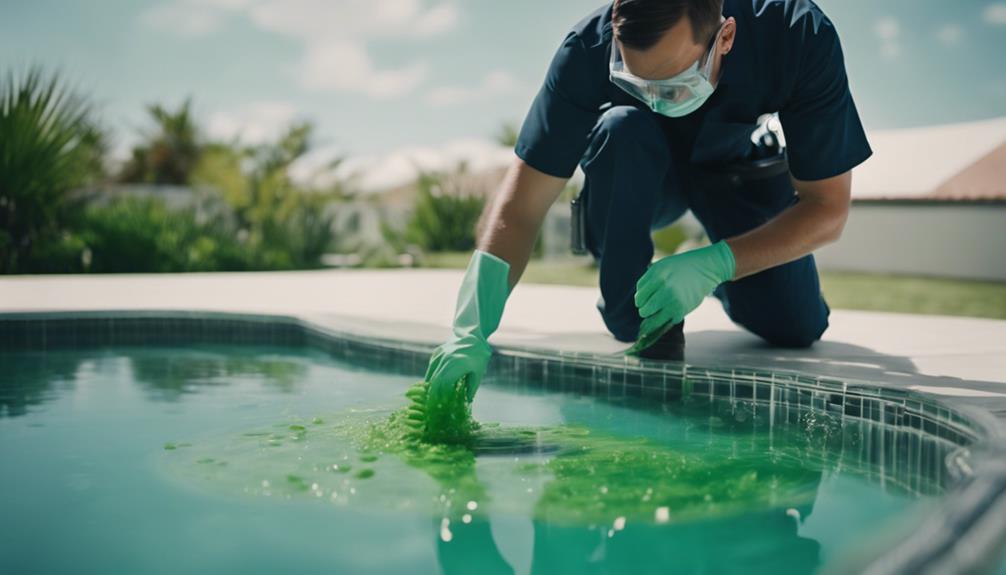Algae growth in pools is a common issue caused by imbalanced chemicals, poor circulation, and organic matter. Regular testing, proper cleaning, and maintaining pH-chlorine balance are essential prevention strategies. Chlorine Shock, algaecides, and thorough cleaning help eliminate existing algae. For advanced measures, professional help, pool covers, and advanced technologies are effective solutions. To maintain a pristine pool environment, understanding the types of algae, causes, and prevention methods is necessary. Ready to enhance your pool maintenance routine? Learn more about algae prevention and removal strategies for a crystal-clear pool.
Key Takeaways
- Imbalanced chemicals and poor filtration foster algae growth.
- Regular testing and cleaning maintain algae-free pools.
- Proper circulation prevents stagnant spots ideal for algae.
- Prompt debris removal inhibits algae spread.
- Efficient chlorine shock and algaecides treat existing algae.
Understanding Algae Growth in Pools
The proliferation of algae in pools poses a significant challenge to both the visual appeal and operational efficiency of the pool system. Algae, a small plant-like organism, not only impacts the aesthetics of the pool but also hinders its functionality.
Green algae tends to cling to pool walls, while black algae thrives in cracks and crevices due to its toughness. Mustard algae, with a dust-like appearance, appears in shady areas.
Algae not only compromises the visual appeal of the pool but also causes filtration issues, making the water uninviting. Understanding the different types of algae and their growth patterns is crucial in implementing effective prevention and removal strategies to maintain a clean and sparkling pool environment.
Common Causes of Algae
Understanding the factors contributing to algae growth in pools is essential for maintaining a clean and healthy swimming environment. Imbalanced chemicals play a significant role in creating a favorable environment for algae to thrive. Poor circulation and filtration systems allow algae to settle and multiply, leading to infestations.
In addition, inadequate maintenance practices, such as irregular cleaning routines, provide opportunities for algae growth. Environmental factors like warm temperatures and the presence of organic matter further fuel algae development. Moreover, failure to promptly remove debris from the pool facilitates the spread of algae.
Algae Prevention Strategies

To maintain a clean and healthy swimming environment and prevent algae growth in pools, it is crucial to implement effective strategies focused on chemical balance, circulation, filtration, maintenance, and environmental control.
Effective algae prevention strategies include:
- Regular Testing: Ensure chlorine and pH levels are within the appropriate range.
- Filter Maintenance: Keep filters clean for best filtration efficiency.
- Routine Cleaning: Regularly scrub and vacuum the pool to prevent algae formations.
- pH-Chlorine Balance: Understand and maintain the delicate equilibrium between pH levels and chlorine effectiveness.
- Circulation Tips: Prevent stagnant spots where algae can thrive by promoting proper water circulation.
Effective Solutions for Algae Removal
For efficient eradication of algae in pools, employing targeted removal techniques is essential. Chlorine Shock is a powerful tool to quickly eliminate existing algae, while Algaecides are effective in targeting specific types of algae for efficient removal.
Brushing and Vacuuming play a pivotal role in physically removing algae formations from affected areas, preventing further spread. Additionally, thorough cleaning of pool accessories is necessary to avoid reintroducing algae into the water.
Immediate action is paramount when addressing algae outbreaks to prevent them from worsening. By combining these removal strategies with proactive prevention measures, pool owners can effectively combat algae growth and maintain a clean and inviting swimming environment.
Advanced Measures and Professional Help

Implementing advanced measures and seeking professional assistance are essential steps for effectively managing persistent algae issues in pools.
Professional pool cleaners possess the expertise and tools to eradicate stubborn algae problems efficiently. Additionally, utilizing pool covers can limit sunlight exposure, hindering algae growth in the pool environment.
Advanced technologies and specialized services are available to combat and prevent recurring algae issues effectively. Seeking professional help not only restores water clarity but also ensures the maintenance of a pristine pool environment.
By incorporating these advanced measures and expert assistance, pool owners can simplify maintenance efforts and gain better control over algae outbreaks, ultimately enhancing the overall pool experience.
- Professional Pool Cleaners: Expertise in eliminating persistent algae problems.
- Pool Covers: Minimize sunlight exposure to inhibit algae growth.
- Advanced Technologies: Innovative solutions to combat stubborn algae.
- Specialized Services: Tailored assistance for effective algae prevention.
- Maintenance Guidance: Professional help for restoring water clarity and maintaining a pristine pool.
Frequently Asked Questions
Can Pets Contribute to Algae Growth in Pools?
Pets can contribute to algae growth in pools through shedding fur, skin cells, and organic matter. Their presence can introduce contaminants that fuel algae growth. Regular grooming, maintenance, and monitoring of pets around the pool can help mitigate this risk.
How Does Rainwater Affect Algae Formation?
Rainwater can introduce organic matter and dilute pool chemicals, creating favorable conditions for algae growth. Its pH imbalance and nutrient content can spur algae formation. Proper maintenance post-rain, like shock treatment and filtration, is essential.
Can High Bather Load Lead to Algae Problems?
High bather load can elevate the organic load in pools, potentially leading to algae problems. Increased body oils, sweat, and other contaminants from swimmers can disrupt pool chemistry, creating conditions conducive to algae growth. Proper maintenance and monitoring are essential.
Is Algae Growth More Common in Saltwater Pools?
Just as a seasoned sailor navigates the salty seas, algae growth can be more prevalent in saltwater pools due to salt's potential to foster algae reproduction. Proper maintenance, including balanced chemistry, remains key.
Are Automatic Pool Cleaners Effective Against Algae?
Automatic pool cleaners, when used in conjunction with proper chemical balance, filtration, and regular maintenance, can be effective in preventing algae growth by removing debris and minimizing stagnant spots where algae thrives. Professional guidance may enhance results.
Conclusion
To sum up, maintaining a clear and algae-free pool environment necessitates a proactive approach to address common causes of algae growth.
Despite potential challenges, implementing preventive strategies and effective removal methods can assist pool owners in preserving water quality and extending the lifespan of their pool.
While some may argue that algae growth is unavoidable, the diligent application of proper maintenance practices and professional assistance can greatly diminish its impact and guarantee a pristine aquatic experience.










